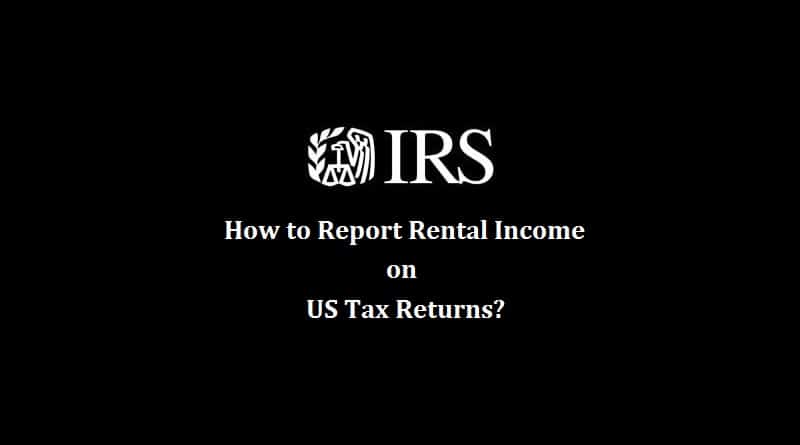How to Report Rental Income on a US Tax Return
Either you’re one of those shrewd investors who prefer their “idle” money gets invested in real estate or think that rental income is a great way to earn passive income, at the end of the year, you have to disclose all the incomes on your income tax return.
Doesn’t matter if you are a sole proprietor, working in a partnership business or as an incorporated business, you may need to report your Rental Income on a US Federal tax return on an annual basis but the complicated (not to forget, boring) tax forms give you chill and you have no clue where and what information to enter.
If you struggle with these conundrums while reporting your rental income on a US tax return then you should read this article for I will not only tell you how to report your rental income on a US Tax Return but will also educate you about complimentary details such as how your legal status as a business affects the reporting of your rental income on the US Federal Tax return.
In return, I hope this will help you through the labyrinth of deciding how your rental income will be reported on the tax return.
Now, without any further ado, let’s jump right in.
How to Report Rental Income On US Federal Tax Return?
First thing first, let’s see what Uncle Sam considers to be a Rental Income or Income from Real Estate Property.
In simple words, and according to the IRS, “Rental income is any payment you receive for the use or occupation of the property.”
Though this is the simplest definition but to add further, the rental income may also include the payments you receive from the services you provide to your tenants like housekeeping, maintenance, etc. Additionally, there is a difference between a “Rental Income” as a side income and “Rental Income” being your main source of income.
Yet another factor, in addition to the legal status of your business, that decides how you’re supposed to report your rental income is the nature of these “services” that you provide to your customers. These factors can heavily affect the way you file your taxes, so it helps to find information and resources that can help ensure that your taxes are filed properly. Sites similar to Webtaxonline is one of many resources that can offer the necessary advice needed to ensure that you file your taxes on time and without issue.
How Legal Status of a Business Affect Rental Income Reporting?
Since the way you do business (incorporated or not incorporated) plays a key role in deciding how you’re supposed to report your real estate rental income on your tax return.
Before we get on the topic how different business entities report rental income differently, let’s first discuss the types of “Legal Statuses” a business can acquire within the US.
These are:
- S Corporation (Incorporated)
- C Corporation (Incorporated)
- Partnerships (Not Incorporated)
- Self-Employed/Sole Proprietorship (Not Incorporated)
Since we have cleared the types of legal businesses in the US out of our way, let’s see how these businesses are supposed to report the rental incomes on their respective returns.
#1. S Corporations
S Corporations report their overall income and expenses on the Federal Tax Return called the 1120S.
However, if renting properties to the tenants is not the “main business” for the S Corporation, then it may need to report the “Rental Income” using an additional form known as the Form 8825.
An S Corporation reports all its Rental Income and relevant expenses on this form.
#2. C Corporations
The IRS requires “C” Corporations to file a tax return called Form 1120. However, to report the “Real Estate Rental Income” as a “C” corporation, you may need to enter all your rental income on line number 6 of form 1120.
Enter the relevant expenses from lines 12 to 26.
#3. Partnerships
Partnerships file Form 1065 as their business tax returns and to report their business income and expenses to the IRS. However, just like the S Corporations, partnership firms also report their income/(loss) from rental real estate activities in Form 8825.
#4. Self-Employed/Sole Proprietorships
When it comes to Self Employed or Sole Proprietorships, deciding which form to use to report income from rental real estate activities is a bit complicated.
Individuals running their businesses as Self Employed/Sole Proprietorships report their annual income and expenses in the tax Form 1040, which is the tax return form for individuals.
In essence, businesses managed as sole proprietorships are not considered separate from their owners.
Now, as a (self-employed) individual or a sole proprietor if you’re receiving rental income then you may either need to include Schedule E or Schedule C on your 1040 tax return.
The decision of which form to use depends on the following situations:
When to Use Schedule E to Report Real Estate Rental Income as a Self-Employed or a Sole Proprietor?
Schedule E is used to report “Supplemental” income. So in order to report your income from real estate rental activities, you should have a convincing reason that the rental income you receive is not your main source of business.
IRS does provide some objective criteria to guide you on this. As a rule of thumb, if you provide just basic services to your tenants, such as, heat and light, trash collection, etc. and nothing else then you normally report your rental income and expenses on Schedule E, Part I. This is of course, in addition to the requirement that the rental income you earn is totally passive in nature.
By passive, IRS means that you don’t have to significantly work for it.
When to Use Schedule C to Report Rental Income?
As far as Income from real estate activity is concerned, Schedule C is a complete antithesis of Schedule E.
You may use Schedule C when the rental income you earn comes from an active business and/or you provide other services which are substantial in nature.
This includes housekeeping, linen service, etc.
So, if you’re a self-employed, real estate developer and/or provide substantial services to your tenants then you need to report your rental income and associated expenses on Schedule C.
Read more details about Form C in this article.
Final Word
That’s it for now. The above article is a very brief guidance about dealing with your income and expenses generated from real estate activity. Just in case you want to dig in further, do click the relevant links above to acquaint and equip yourself with an even wider knowledge of the tax forms required.




